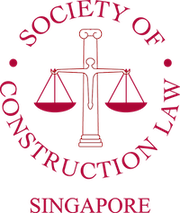- Details
- Hits: 2524
Council Member's Message - December 2023

Dear members,
As we round off 2023 and start gearing up for 2024, Collaborative Contracting, the application of Environmental, Social & Governance (‘ESG’) and Appropriate Conflict Avoidance and Dispute Resolution, that have to some extent been thrust to the forefront of all things related to the construction industry and practices, will likely feature significantly in 2024 and beyond.
The honourable Minister Indranee Rajah (Singapore’s Second Minister for National Development and Finance) raised these during the Singapore Contractors Association Limited’s annual dinner on 24th October 2023
‘How can we approach construction differently, so that it becomes more robust and resilient, and the [Built Environment] sector as a whole can be transformed?’ and
‘To combat climate change, how can we rachet up our capabilities in sustainable construction?’
as two of three issues that needed to be addressed.[1]
The honourable Minster went on to highlight that the first big change the Built Environment needed to make was to get the stakeholders to collaborate right from the outset, intended to reduce conflict, inefficiency and friction while being fair to all the parties involved – and hence driving the adoption of collaborative contracting to facilitate that shift.
Interestingly, while the recently concluded Society of Construction Law (India)’s biennial International Construction Law and ADR Conference (8 to 10 December 2023, New Delhi)[2], addressed a very many of the same issues that constantly affect the construction industry and projects are still prevalent – Delay (liabilities, claims, and quantification), Liquidated Damages), Variation, and Appropriate Dispute Resolution, managing mega construction - infrastructure projects, and the roles of legal professional, ADR practitioners and experts, it was indeed exhilarating to note that the very first plenary session was on Collaborative Contracting – considering how it operates, what are and are likely to be the complications including in India, and experiences both internationally and from Singapore (which I had the honour to share on).
At its essence, the application of both collaborative contracting and ESG requires a cultural mind set change from how the industry has been operating for decades – not impossible nor daunting tasks.
While the following was stated at the height of the COVID-19 pandemic, it is my humble view that the construction industry is well placed to apply these guiding views in its drive toward adopting ESG, collaborative contracting, and appropriate conflict avoidance and dispute resolution - At the World Economic Forum’s COVID-19’s legacy: This is how to get the Great Reset right on 14th July 2020[3], the article quoted from Klaus Schwab and Thierry Malleret’s book –
“The fault lines of today’s world – most notably: social divides, lack of fairness, absence of cooperation, failure of global governance and leadership and the critical degradation of our natural assets – lie exposed as never before, and many now feel the time for reinvention may have dawned.
Will there be enough collective will to take advantage of this unprecedented opportunity to reimage our world, in a bid to make it a better and more resilient one as it emerges on the other side of this crisis?”
Here’s to a great year ahead as we at the SCL(S) urge both members and industry partners to join us, as we scale up (as SCL(S) has every year) our activities in keeping its objective of “promoting the education, study and research (and publication of the useful results of such research) in the field of construction law and related subjects both in Singapore and overseas for the benefits of the public and the construction industry”.
Anil Changaroth
Council Member, SCL (Singapore)
[2]https://conference.sclindia.org/
[3]https://www.weforum.org/agenda/2020/07/covid19-this-is-how-to-get-the-great-reset-right/


